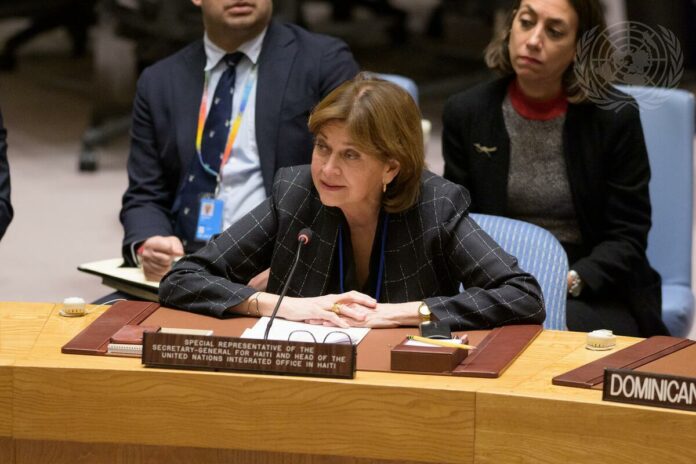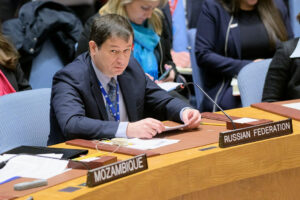
(Français)
On Jan. 24, 2023, the United Nations Security Council (UNSC) again reviewed the situation in Haiti at the request of Secretary General António Guterres, who continues to pressure for foreign military intervention into the country of 12 million.
In addition to the five permanent members (the U.S., Russia, China, France, and the United Kingdom) and ten rotating members (newly joined this month by Ecuador, Japan, Malta, Mozambique, and Switzerland), the meeting heard statements from Canada, the Dominican Republic, and Haiti.
Helen La Lime, Guterres’ emissary to Haiti and the outgoing chief of the UN’s Integrated Office in Haiti (BINUH), gave the only briefer’s report to the meeting, which was chaired this month by Japan. The last UNSC meeting on Haiti on Dec. 21, 2022, also had briefings by Gabon’s Ambassador Michel Xavier Biang and journalist Kim Ives of Haïti Liberté, who offered a sharp counter-narrative to La Lime’s.
As usual, the BINUH chief began with an ominous summary of Haiti’s dysfunction.
“Gang-related violence has reached levels not seen in decades,” she began. “Murders and kidnappings increased for a fourth consecutive year:1,359 kidnappings were recorded in 2022, more than doubling that recorded in 2021, averaging roughly four per day. Murders are also up by a third since the previous year. A total of 2,183 were reported in 2022, touching near all segments of society…”
She announced that BINUH, with the UN Office of the High Commissioner for Human Rights, would soon release reports on the “turf wars involving two gang coalitions, namely the G9 coalition and G-Pep,” saying their battles were “part of well-defined strategies designed to subjugate populations and expand territorial control.”
Nowhere did she highlight the G9 coalition’s explicitly anti-crime agenda versus G-Pèp’s kidnapping criminal gang composition (Ti Lapli, Izo, 400 Mawozo, Vitelhomme, etc.).

Without naming any specific perpetrators, La Lime reported that “[g]angs have increasingly resorted to the deliberate killing of men, women, and children with snipers positioned on rooftops. Dozens of women and children as young as ten years old have been brutally raped, as a tactic to spread fear and destroy the social fabric of communities under the control of rival gangs. Besieging and displacing whole populations already living in extreme poverty, gangs have intentionally blocked access to food, water and – amidst a cholera outbreak – health services. Close to five million people are facing conditions of acute hunger across the country, and while 90% of schools are now operating, thousands of children, especially those living in gang affected areas, are yet to start the school year… The Humanitarian Response Plan will likely be close to double that of 2022.”
La Lime never laid any blame for the dreadful scenario she described on the government of de facto Prime Minister Ariel Henry. On the contrary, she implicitly lauded the government by pointing to a promising “key development:” the formation of the “National Consensus Agreement for an Inclusive Transition and Transparent Elections,” supported, she claimed, by “a broad spectrum of political figures, [civil society organizations] CSOs, religious authorities, trade unions, and the private sector.”
She did not mention that the new coalition was met with a chorus of outrage, ridicule, and condemnation in the Haitian press, social media, and political class, particularly from Henry’s arch-rival coalition, the Montana Accord. Several of the Consensus’ signers – like the Haitian Boy Scouts – disavowed ever signing the new political accord (which conveniently was sealed as the Dec. 21 UNSC meeting took place), and one man signed on behalf of three different organizations. On the contrary, La Lime claimed “adherents are growing every day.”
“Haiti is also living through a crisis… largely caused by external political engineering and neo-colonial policy”
The “Consensus identifies a calendar for installing an elected Government by February 2024 and lists immediate steps to be taken for the promotion of fiscal reforms to increase state revenue collection and restore public services,” La Lime explained. “A‘High Transitional Council’ [HTC, headed by former presidential candidate, Myrlande Manigat, 83] has now been established and named, which will work with [the] Government to make nominations to the Court of Cassation (the country’s highest court), the Provisional Electoral Council, and appoint a committee to review the constitution.”
The other “key development” she touted was “the unanimous adoption of Resolution 2653 establishing sanctions measures on those supporting criminal activities and violence involving armed groups.” She claimed that “bilateral sanctions were also welcomed during this period,” although she didn’t specify by whom and the Russian representative decried the unilateral moves by Canada and the U.S. in both the December and January meetings.
After noting that the Haitian National Police (PNH) are getting about 50% more funding, over 700 new officers, and new armored vehicles from the U.S. and Canada, she closed by saying rather sanguinely and hyperbolically that “the National Consensus and sanctions are two important developments that can meaningfully contribute to overcoming the crisis and help alleviate untold suffering,” offering “a clear path to the restoration of democracy and legitimacy.”
But her key request was for the UN to authorize “the deployment of an international specialized force,” arguing “that without this international deployment, operating in an integrated way with the [PNH], the very positive effects of the political process and the sanctions so far, will remain fragile and vulnerable to being reversed.”
Then she moved from the realm of “half-truth” into outright lying.
“Haitians overwhelmingly want this assistance so they can go about their daily lives in peace,” she closed. “The population is living in fear and is all too conscious of the limitations of the police force.”
In fact, through demonstrations, editorials, public statements, radio shows, press articles, and social media posts since Ariel Henry requested foreign troops on Oct. 9, there has been one clear and overwhelming call across Haiti and its diaspora: “UN, U.S., and Canada, no military intervention in Haiti!”
Unfortunately, during this UNSC session, there was nobody to forcefully contradict her.

After La Lime’s speech, 13 UNSC members made statements as did guests Canada, the Dominican Republic, and Haiti. Most positions were anodyne, with general agreement on sanctions.
The U.S., France, and Canada all prudently buried their interventionist agenda under UN diplo-speak. U.S. Alternate Representative for Special Political Affairs, Robert A. Wood, made no mention of the need for a foreign force but just obliquely referred to the Global Fragility Act, for which Haiti is the pilot case and in which a U.S. military force is embedded. France’s ambassador Nathalie Broadhurst Estival said “we stand ready with our partners to do more to rectify the [security] situation on the ground.” Canada’s Ambassador Robert Keith “Bob” Rae simply said “we need to do more, but we also need to do things differently than in the past,” even recognizing that previous “large outside military interventions… have actually failed” but adding that “we will continue to work with the Council to see what else needs to be done.”
Haiti’s ambassador Antonio Rodrigue and the Dominican Republic’s ambassador Roberto Álvarez Gil renewed their calls for foreign military deployment, to which there was no explicit push back… except by Russia’s First Deputy Permanent Representative Dmitry Polyanskiy.
“Haiti is also living through a crisis of statehood which was largely caused by external political engineering and neo-colonial policy,” he said. “This does not allow some of our colleagues on the Council to call things by their real names.”
He reiterated Guterres’ long-ignored call “to investigate the assassination of [Jovenel] Moise. Over the 18 months that passed since this tragedy, which had clear traces of external interference, there has been no progress with the investigation.”
But most importantly, he called out U.S. and Canadian maneuvers and warned the body that sanctions and foreign military invasion could not be equated. “We were rather disappointed to see that in a document that had a signature of the UN Secretary-General on it, unilateral coercive measures were almost equaled to UNSC-imposed sanctions and that these two profoundly different tools are listed in the same paragraph of the report,” Polyanskiy said. “It is common knowledge that in other countries of the world, unilateral sanctions have already triggered direst economic and humanitarian consequences… Speaking of Haiti, we perceive such sanctions as an attempt of the United States and Canada to influence the domestic processes in Haiti the way they need. These steps cannot be interpreted as the will of the international community, because such will can only be expressed through the decisions of the [Gabon-presided] Sanctions Committee… that we established recently.”
China’s ambassador to the UN Zhang Jun also seemed to lean against external military involvement, saying “when considering the dispatch of troops, countries should take into full consideration the different views within Haiti and avoid repeating the historical lessons of failed foreign interventions.”
Mexico has now rotated out of the UNSC, so Ecuador will now be the “co-penholder” working with the U.S. to draft the body’s future resolutions on Haiti.










[…] 24: Helen La Lime, chief of the UN Office in Haiti (BINUH), addresses the UN Security Council to again push for foreign military intervention in Haiti, while China warned that “countries should take into full consideration the different […]